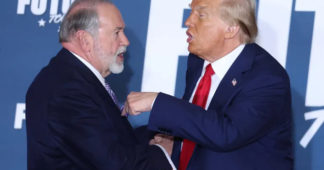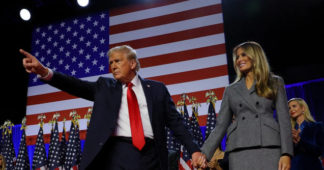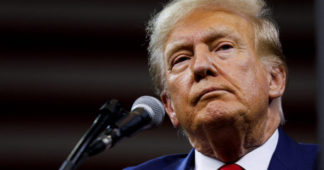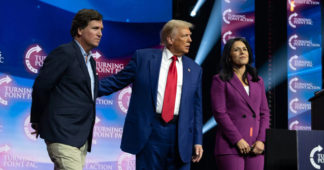Donald Trump has received praise for being a dove when it comes to international affairs. His record and early cabinet selections tell a different story.
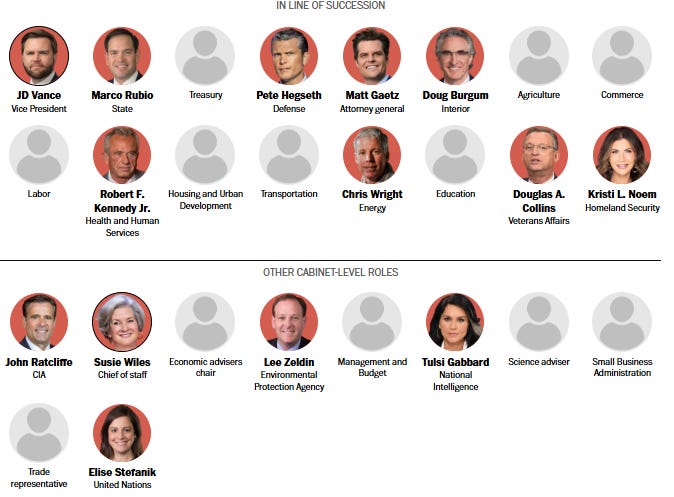
Mythology has always played a central role in American politics and once a falsehood is sculpted, the premise becomes very difficult to break.
When it comes to Donald Trump, one of the most prevalent fabrications surrounds the 45th [and now also the 47th] president’s war record. According to many MAGA loyalists, Trump is significantly less hawkish than the presidents who’ve served before and after his time in the White House. This lie is so widespread that even many of those who openly oppose the president feel the need to partake in this ill-placed and undeserved praise.
Any notion that Trump was a peace-seeking commander-in-chief who spent his time in the Oval Office fighting America’s war machine is a fantasy coated in convenient omissions, blatant lies, and wishful thinking.
Anyone still unconvinced by his record should consider some of the cabinet picks Trump’s floated since winning re-election. Although only a few nominations have been announced, the names that Trump’s transition team has publicized should serve as a solid indicator of what foreign policy in a second Trump term will look like. Just as he did the first time around, Trump appears to be filling his administration with a slate of neocons with some rather disturbing views about the US government’s role in the world.
Trump’s most consequential selection to date is Marco Rubio, who will seek confirmation as the president’s choice for secretary of state. First elected to the US Senate in 2010, Rubio never hesitated to serve the needs and wants of the US security state.
In June 2011, he co-authored an op-ed with the equally hawkish Joe Lieberman, the late former senator from Connecticut, arguing for regime change in Libya. The piece – published by the CIA’s unofficial newsletter, The Wall Street Journal – pushed for intensifying airstrikes in the country and treated the debate regarding whether President Obama required congressional authorization to continue his bombing campaign as a quaint but ultimately unimportant distraction.
Just a few days later, Rubio took to the Senate floor to continue his advocacy for intervention, framing the situation at hand as a “fight that only has two possible endings.”
“It can end with the fall of a brutal, criminal, anti-American dictator,” Rubio stated. “Or it could end in the dictator’s victory over our allies and us.” As is the case with all US-led interventions, the rosy promises offered by Rubio’s side of the debate never took hold.
What began as a so-called “humanitarian” mission effectively destroyed the country, turning Libya into a failed state run by militias.
The assistance politicians like Rubio insisted was essential came in the form of a seven-month bombing campaign by US and NATO forces that produced a death toll that will never be properly tallied.
As
detailed in a September 2023 article, after Muammar Gaddafi was sodomized with a bayonet and killed by a mob later that year, Libya descended into pandemonium:
“The chaos that followed Western intervention saw weapons from the country’s arsenals flood the black market, with many snatched up by groups such as the Islamic State. Civil society ceased to function. Journalists captured images of migrants from Nigeria, Senegal and Eritrea being beaten and sold as slaves to work in fields or on construction sites. ”
In the same piece, Hedges continues with a salient point that is often overlooked:
“Gaddafi — who I interviewed for two hours in April 1995 near the gutted remains of his home that was bombed by U.S. warplanes in 1986 — and Hussein were targeted not because of what they did to their own people, although both could be brutal. They were targeted because their nations had large oil reserves and were independent of Western control. They renegotiated more favorable contracts for their nations with Western oil producers and awarded oil contracts to China and Russia. ”
It’s not so much that propagandists like Rubio don’t understand the history of Western intervention or that they don’t hear the warnings so many of their constituents send their way as much as the fact that they recognize the political rewards of always championing the US establishment’s wars. For a shameless opportunist like Rubio, the reward has materialized in the form of one of the most influential posts in the Western world.
This is not the only foreign entanglement Rubio has fumbled.
Without a shred of self-awareness, in a Washington Post op-ed several years later in which he stressed that “any successful effort against the Islamic State must include a plan for removing Syrian dictator Bashar al-Assad from power,” Rubio lamented the fact that “Libya, with its absence of government control and its vast stocks of weapons, has become a particularly deadly terrorist haven that is allowing the Islamic State to broaden its map, gain strength and plot attacks against Europe and the United States.”
Rubio supported Operation Timber Sycamore, the CIA program that spent billions arming and training what the US government claimed were “moderate” rebels in Syria, but ultimately propped up some of the most violent groups in the region instead. Because its geopolitical aims of weakening and ultimately overthrowing the Syrian government is all the West cared about, the US continued the program.
The stances Rubio has taken on just about every other foreign policy issue have been just as accommodating to the State Department’s preferred policies.
He supports sanctions on Iran. He never hesitates to fearmonger about China’s supposed threat to the US. He has supported and continues to support Israel’s ceaseless bombardment of Gaza and has endorsed the Israeli strikes on Iran that risk pulling the entire region [as well as the US] into a dangerous full-scale conflict with Tehran.
The rest of Trump’s picks aren’t all that different. There’s little sense in dissecting all of their foreign policy positions because they track so closely with Rubio’s.
Mike Waltz, the Republican serving Florida’s 6th congressional district who once advocated for a permanent US military presence in Afghanistan, is the president-elect’s choice for National Security Adviser.
“I think we’re in for a long haul, and I think our nation’s leadership needs to begin telling the American people, ‘I’m sorry, we don’t have a choice; we’re 15 years into what is going to be a multi-generational war because we’re talking about defeating an idea,” Waltz told the CPAC audience in 2017. “’ It’s easy to bomb a tank; very difficult to defeat an idea, and that’s exactly what we have to do.”
In the midst of the 2021 debate regarding how to end the 20-year occupation, The Intercept’s
reported on Waltz’s blatant conflict of interest in his push to continue the war:
“Before his successful run for Congress in 2018, he managed a lucrative defense contracting firm [Metis Solutions] with offices in Afghanistan. The company was recently sold to Pacific Architects and Engineers, or PAE, one of the largest war contractors the U.S. has hired to train and mentor Afghan security forces. The deal personally enriched Waltz by up to $26 million, a figure made public by a filing disclosed this month.”
John Ratcliffe, who’d previously served as the Director of National Intelligence, was tapped to lead the CIA. Tasked with producing the President’s Daily Brief in this previous role, Ratcliffe is a fanatical China hawk who just last year lobbied House Speaker Mike Johnson for the extension of Section 702 of the Foreign Intelligence Surveillance Act (FISA), a law that allows the government to spy on American citizens.
Elise Stefanik, the Albany native representing New York’s 21st congressional district who’s proven herself to be one of Trump’s most loyal and unwavering supporters, received the nod to serve as the next US Ambassador to the UN.
Once she’s confirmed by the Senate, Stefanik will represent the US at an organization that she’s spent the past year insisting has been corrupted with “antisemitic rot”. Throughout the duration of the war, Stefanik has baselessly branded any attempt by the UN to hold Israel accountable for its actions in Gaza as an attack against the world’s Jewish population.
Despite an official death toll that has now soared past 43,000, widespread starvation, the displacement of nearly the entire Palestinian population, and a multi-pronged campaign to annex more Palestinian land, Stefanik has urged the importance of “supplying the state of Israel with what it needs, when it needs it, without conditions”.
In the midst of the most consequential conflict on earth, the US government’s top diplomat is slated to be an individual who seemingly has no belief in the virtues or effectiveness of diplomacy.
Undoubtedly, Trump’s most unhinged selection is Pete Hegseth, the Fox News commentator who will await confirmation as the next Secretary of Defense.
Other than being a hopeless Trump sycophant on the air, Hegseth has already played the part of advising the president behind the scenes, even lobbying him to pardon American soldiers accused of shocking and disturbing war crimes in Iraq and Afghanistan.
As the Daily Beast reported in 2019, the incoming defense… secretary appears to believe that US servicemembers should have the authority to operate with impunity while serving overseas:
On Sunday, Hegseth said on Fox & Friends Weekend that he “can’t stand” news outlets referring to the charges against [Edward] Gallagher as war crimes. “These are men who went into the most dangerous places on earth with a job to defend us and made tough calls on a moment’s notice,” he said. “They’re not war criminals, they’re warriors.” In fact, he has dismissed the soldiers’ alleged crimes as simply having made “tough calls” on at least eight separate occasions this year.
Anyone still under the illusion that Donald Trump is an anti-war pacifist attempting to drain the swampiest parts of the Pentagon should first consider his hawkish track record as president.
This is, after all, a commander-in-chief who proudly and enthusiastically put his signature to an NDAA that authorized $682 billion in military spending in 2018, a 5.5% increase from the year prior. At this moment in time, the US was already spending more on its military than the next seven highest foreign military budgets, combined. Somehow, it wasn’t enough, and annual increases of 7.5%, 6%, and 3% would come in the years that followed. These pointless and irresponsible boosts – signed into law by President Trump – made money for defense contractors and drew applause at rallies, but also made the world more dangerous.
According to the Bureau of Investigative Journalism, a UK-based think tank, the US launched 2,243 drones during the first two years of Trump’s presidency. This compares with 1,878 strikes during all eight of Obama’s years in office.
This is also a president who has received praise in many circles for not starting any new wars – an embarrassingly low standard – but he needlessly accelerated the ones we were already fighting, killing thousands of innocent people in the process. His supporters cheered his increases in so-called “defense” spending but chose to ignore the human toll of these policies.
He had the power to end the war in Afghanistan but chose not to, and since leaving the White House, has noted many times that he would’ve actually left a footprint of 4,000 American troops in the country had he stayed in office in 2021.
As this page has detailed numerous times before, Trump’s foreign policies were reckless, deadly, and in line with the establishment’s blueprint for global dominance.
The idea that Donald Trump is “anti-war” is a lie contradicted by his four years in office. After re-examining his record, anyone who believes that Trump’s second term will be different than the first should consider the foreign policy team he is now trying to assemble.
We remind our readers that publication of articles on our site does not mean that we agree with what is written. Our policy is to publish anything which we consider of interest, so as to assist our readers in forming their opinions. Sometimes we even publish articles with which we totally disagree, since we believe it is important for our readers to be informed on as wide a spectrum of views as possible.
